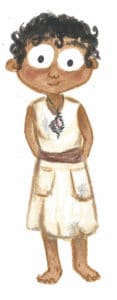Babylonian diviners were famous worldwide in the Ancient World, though the Greeks did not value their activities very much. According to them, Mesopotamian divination was nothing more than a jumble of superstitious beliefs.
I want to be a
diviner when I grow up. I
already know many omens:
my fatherhas tablets where
the signs andtheir meanings
are written down.
But for the Mesopotamians, the world is ruled by a complex system of correspondences between signs and human life, that relates all events to one another. The omens, the signs were understood as messages from the gods.
Mesopotamian divination is a lot more than telling the future:
- It is a mean to understand and explain the world
- It is a mean to communicate with the god and obtain inaccessible information
Divination is thus essential in Ancient Mesopotamia: information sought through divination touches all aspects of life and everybody, the king as well as the commoners. People would turn to divination for the conduct of the war as well as for the building of a house.
Yet there is no fatality in Mesopotamian divination: all bad signs can be averted with incantations and appropriate rituals. Omens were only warnings.
There are two main categories of divination in ancient Mesopotamia, the provoked and unprovoked omens.
- For the first ones, a specific question is asked to the gods, often a very detailed one. Extispicy, inspection of the entrails of sacrificial animals (mainly sheep), is the most widespread form of the provoked omens.
- The unprovoked omens were a way to interpret the messages from the gods by paying attention to all signs, not only spectacular or extraordinary phenomena, but also ordinary ones.
I don’t like
much the idea to kill a sheep to
read its liver. I don’t want to be
a bārû, I want to be a ṭupšarru
to understand all the signs!


